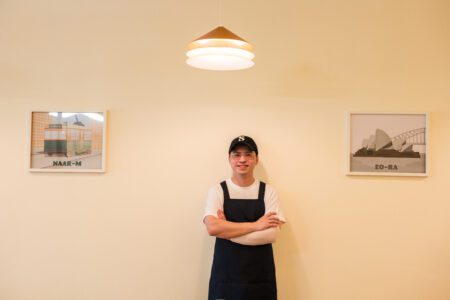
Every bookworm’s passion for the hobby starts in a similar fashion. A favourite book series, a respected author, a penchant for daydreaming regularly – or all three.
Eventually, some of this passion evolves into writing stories of their own, some even filled with a legion of original characters.
One of them even included a roti who could bend the laws of physics.
As absurd as it sounds, it takes time and effort to come up with plots, back stories, and personalities.
Serious writing is a full-time job, but Joshua Lim wanted more. In fact, a lot more.
He added the pursuit of one of the hardest degrees in the world: medicine.
Lim at the Book launch of “A Spoonful of Malaysian Magic” anthology at the George Town Literary Festival 2023. Source: Joshua Lim
Developing a passion for writing stories
Lim’s favourite books growing up were classic staples for many Gen Z-ers. “Lord of the Rings” and “Percy Jackson” were household names in every family with a bookworm, and the young adult/fantasy genre was at an all-time peak.
“I read a lot and thought that it was cool to be able to produce stories like that,” says Lim.
Though Lim spent his early years dabbling in storytelling, science remained his primary focus.
It wasn’t until a school poetry competition at Hin Hua, a Malaysian Chinese independent school, that he realised his side passion might just be something more.
View this post on Instagram
Lim spent his teenage years focused on doing well in the academically demanding Malaysian Chinese independent school system and getting into medical school.
Life threw a few curveballs as well.
He had to complete both his Unified Examination Certificate (UEC) and the Malaysian national exam – the Sijil Pelajaran Malaysia (SPM) – at the peak of the COVID-19 pandemic.
Being from the science stream, which usually required a lot of physical classes in the lab, meant he was forced to adapt to an online syllabus instead.
But during that year, he was also presented with an opportunity. A local publisher had issued a call for submissions of short stories, and he happened to come across it while preparing for his exams.
“I thought to try my hand at it and see if I got lucky – and I did,” he says. “My short story got accepted, I got paid for it, and that marked my first published work.”

After graduating, Lim was invited back to Hin Hua to give talks related to books. Source: Joshua Lim
Gambling over ashes, flatbread that makes you time-travel, and a vengeful soul shepherd
Since 2021, Lim has started publishing short stories more regularly. His work can be found in magazines, anthologies published by Inklings Press, Fixi Novo, Teaspoon Publishing, and Maya Press, as well as
One of his favourites was a short story titled “Generation Game Night,” which tells how a Chinese family started gambling over their grandmother’s ashes, seemingly a lucky charm.
“That was a little more light-hearted, but I wrote it because my grandfather passed away in 2021,” explains Lim. “When we were talking about what to do with his ashes, an idea formed, and then this story came about. I had a lot of fun writing it.”
Another story that was personal to Lim was “Roti Time Travel,” which depicted a man’s addiction to time-travelling flatbread, unable to move on from his family’s death.
“I originally intended for ‘Roti Time Travel’ to be a comedic story with a ridiculous premise – time-travelling bread? What?” Lim notes. “But I was going through a period of mourning in my life when I finally picked up the pen, and I believe writing this story helped me to process my grief.”
Other featured stories include “Soul Shepherds,” which Lim wrote in memory of the victims of MH17 and MH370, the world-remembered as earth-shattering tragedies, and “Klang Crow,” a story about his hometown, published in “The Big Book of Malaysian Horror Stories.”
While these stories revolve around horror and dark fantasy, Lim admits he’s not much of a horror reader or writer in the first place.
“As of 2025, I’ve written about 15 stories, and six of them are horror simply because they were written for specific submission calls,” he says. “That’s how these calls work sometimes – they ask for specific themes like horror or monster-related ones, and I start thinking of how I can put together some ideas I already had.”
His work even earned him recognition from his alma mater. Lim was invited to Hin Hua in 2023 to present his work to younger students and give a talk about writing stories.
“That year, I was also invited to judge the prose and poem competition, and I’ve been doing that every year since,” he adds. “It’s an honour.”

Some of the venues Lim’s short stories have appeared in, both online and in print. Source: Joshua Lim
Keeping a hobby as, well, a hobby
One thing that Lim was sure of, despite his prowess in writing stories, was that he didn’t want to treat writing as his primary source of income. He was content seeing it as a hobby and had always fully intended to pursue a career in the medical field.
“I didn’t want to put all my eggs in one basket. Writing stories is still something I do in my spare time,” he confesses. “I know it seems counterproductive – going into medicine where I have no time to write at all – but I’ve always been quite a science-y person, so medicine was the end goal for me.”
Now, a medical student at the University of Liverpool, Lim indeed struggles to find time to write stories. “I’m currently studying medicine in the UK because I love depriving myself of free time to write,” he jokes on his blog.
But despite his demanding schedule as a teenager and now a medical student – doing practical clinical runs in a foreign country, no less – Lim always made sure he had time to sit down and write. Surprisingly, his field now offers clarity on his writing genres of choice.
“I grew up reading fantasy, so it’s natural for me to write about that,” he says. “But now, I think due to my nature of studying medicine, I’m always surrounded by an environment where death is present. I consider things like, what could be fatal to this patient? What should I identify immediately? What do I need to do to save this patient? I think this entire point about studying medicine makes death a very present component in my work.”
As he approaches his fourth year of medical school, Lim continues to actively write and submit new stories to publishers, hoping that his work will be published in anthologies, magazines, or similar publications.
“My favourite story I’ve written so far hasn’t been sold yet, but I’m still sending it out,” he chirps. “Lots of rejections, but that’s just part and parcel of the publishing experience.”
He admits that submitting stories to publications has become increasingly difficult with the advancement of generative AI platforms like ChatGPT. Publishers were now swamped with submissions, and many have closed their inboxes to vet through them and weed out AI-generated ones.
Lim remains positive.
He’s determined to write as much as possible between his classes and medical practicals. Even during his pre-clinical years, he’d squeeze in some writing between his exams held every six weeks.
“My day-to-day isn’t very creative, because well, you’re not really meant to be creative in the medical world,” he says. “As a result, there is that contrast there. I’m thankful for that, though!”










